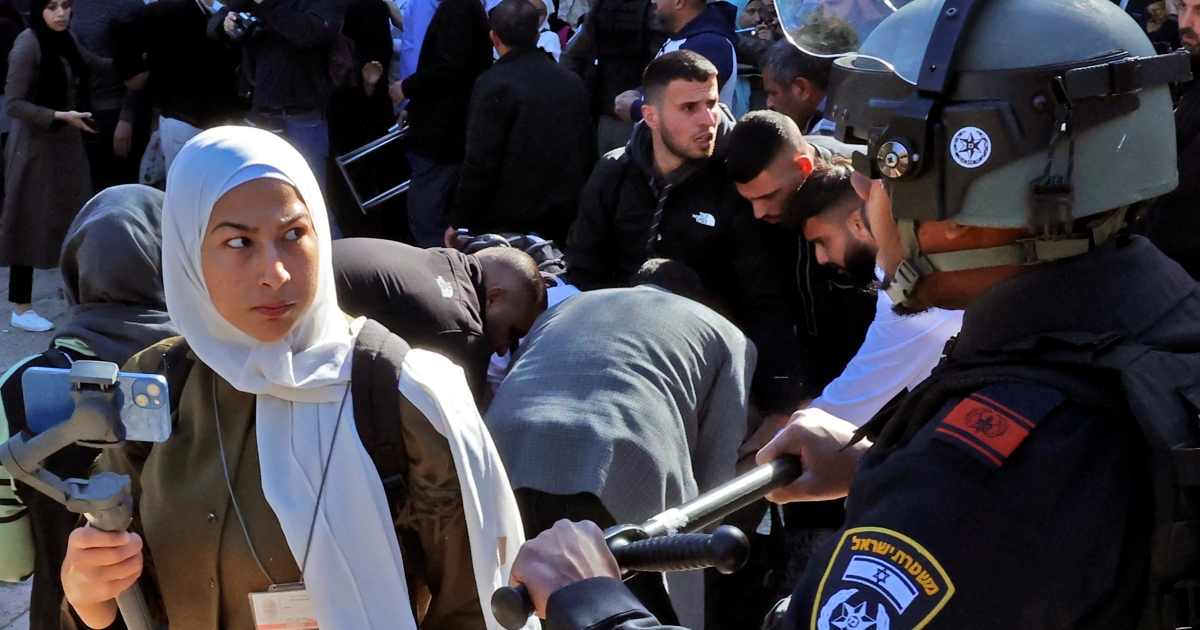
Mood in Jerusalem already heightened after Israeli army killings of Palestinians and Palestinian attacks on Israelis.
Almost one year after confrontations between Palestinians and Israeli security forces in Jerusalem led to war in the Gaza Strip, escalating tension in the city during the holy month of Ramadan has raised fears that events of 2021 could repeat.
At least 158 Palestinians were wounded when Israeli riot police raided the Al-Aqsa Mosque compound on Friday where they were met by stone throwing and hurled firecrackers.
The Al-Aqsa compound sits on a plateau in occupied East Jerusalem, which Israel captured in the 1967 Six-Day War and later annexed in a move not recognised by most in the international community.
For Muslims, the compound hosts Islam’s third-holiest site, the Al-Aqsa Mosque, and the Dome of the Rock, a seventh-century structure believed to be where the Prophet Muhammad ascended to heaven.
The compound is also where Jews believe the Biblical Jewish temples once stood and is known to them as Temple Mount.
The contested site has been the focal point of the decades-long Israeli occupation of the West Bank.
“Jerusalem is perhaps the number one issue that has the potential of triggering wide-scale violence,” said Khalil Shikaki, director of the Palestinian Center for Policy and Survey Research.
“We have seen that in the past,” he said.
Deadly attacks on Israelis by Palestinians in the past two weeks and Israeli soldiers killing Palestinians in the occupied West Bank has caused outrage and the temperature in the holy city is reaching boiling point as the festivals of Ramadan, Passover and Easter are all marked this month.
Palestinian Prime Minister Mohammad Shtayyeh described the Israeli police raid on the Al-Aqsa Mosque as a “brutal assault on worshippers during the holy month”, and a dangerous omen.
At a rally in Gaza, a spokesman for Hamas, which rules the enclave, said that Israel’s use of force at the holy site would not go unanswered.
“We will draw the line again in defence of Jerusalem and we will launch a new era; weapons for weapons, and force will only be met by force, and we will defend Jerusalem by all our might,” the spokesman Fawzi Barhoum said.
Almost a year ago in May 2021, Palestinian armed groups fired rockets into Israel after Hamas demanded Israeli police withdraw from Al-Aqsa and the Jerusalem neighbourhood of Sheikh Jarrah, where a court threat to dispossess Palestinian residents led to protests and confrontations.
In the 11-day war that followed, 250 Palestinians in Gaza and 13 people in Israel were killed.
Israel’s Prime Minister Naftali Bennett said authorities are working to restore calm in Jerusalem and across Israel, but security forces were ready if the situation deteriorated.
“We are preparing for any scenario and the security forces are ready for any task,” he said in a statement.
Wave of killings
Marwan Bishara, Al Jazeera’s senior political analyst, expects that further escalation will take place in the coming days.
“I think a whole generation of Palestinian youth is simply taking advantage of every possible opportunity, every possible stone, every possible gun, in order to shout their way against the occupation,” he said.
“In light of political and diplomatic paralysis, in light of the weakness of the Palestinian Authority, and the indifference of various Arab regimes that just recently were in bed with the Israeli government, I think we could see more tensions and possibly another uprising.”
Last week, a Palestinian from a refugee camp in the occupied West Bank town of Jenin shot dead three Israelis and wounded several more at a Tel Aviv bar.
The shooting was the latest in a string of Palestinian attacks in Israeli cities that have killed 14 people.
Bennett called the attacks, which were the deadliest since 2016, “a new wave of terror”.
The Israeli army has killed 47 Palestinians so far this year.
According to the Euro-Med human rights monitor, that number represents almost five times the number of Palestinians killed by the Israeli army during the same period of time last year.
“The authorisation of the Israeli politicians for the army and security to operate with ‘full freedom to defeat terrorism’ seemed to have paved the way for the unjustified excuse to kill and abuse Palestinian civilians at military checkpoints and in the cities, villages, and towns of the West Bank and East Jerusalem,” the monitor said in a statement.
The increased killing of Palestinians is linked to the Israeli army’s shooting policy instructions of December 20, which gave the green light for soldiers in the occupied West Bank to open fire on Palestinian youths who throw stones or Molotov cocktails, the monitor said.
“There are no restrictions on the use of force,” Israeli Foreign Minister Yair Lapid said on Thursday, echoing Prime Minister Bennett.
He added that Israel would also allow Palestinians who “maintain the quiet” to work and celebrate Ramadan without disruptions.
Until Friday’s raid at Al-Aqsa, the foreign minister’s promise had appeared to ease some Palestinian frustrations, Shikaki said.
However, pent-up anger and grievances over Israel’s 55-year military occupation of Palestinian territories outweighed the current concessions, he said.
In the occupied territories of the West Bank and East Jerusalem, the year 2021 marked the highest rate of Palestinian home demolitions since 2016, according to the Israeli human rights group B’Tselem.
In the last five years, Israel has granted just 33 building permits to Palestinians and more than 16,500 building permits to Jewish settlers in the 60 percent of the occupied West Bank it directly controls, according to Itay Epshtain, a humanitarian law and policy consultant, citing data disclosed by Israel’s defence ministry.
“The whole structure that is in place, of the occupation, is violent,” said Diana Buttu, a former legal adviser to the Palestine Liberation Organization.
“It’s been decades of this, decades of daily violence, and it gets to a point where eventually it just boomerangs back onto Israel.”







